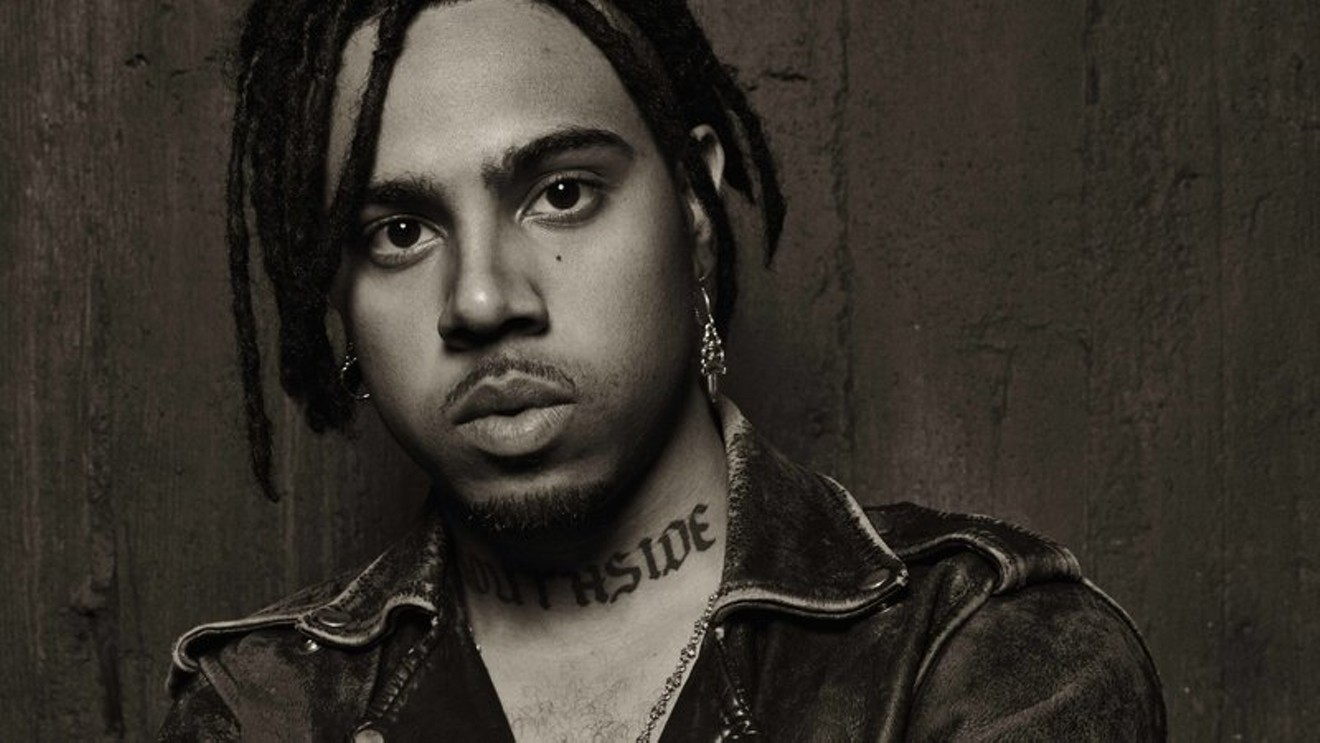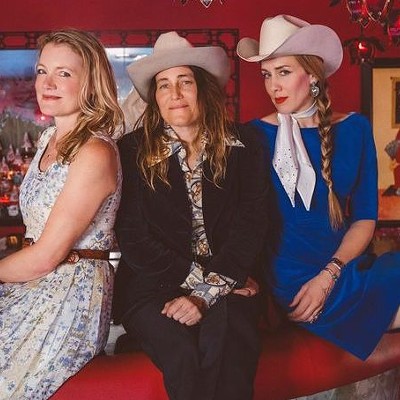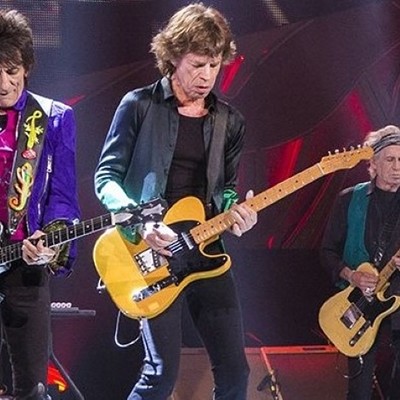Support Us
Houston's independent source of
local news and culture
account
- Welcome,
Insider - Login
- My Account
- My Newsletters
- Contribute
- Contact Us
- Sign out

Chicago's Vic Mensa has plenty to say and little to worry about.
Photo courtesy of Vic Mensa
[
{
"name": "Related Stories / Support Us Combo",
"component": "11591218",
"insertPoint": "4",
"requiredCountToDisplay": "4"
},{
"name": "Air - Billboard - Inline Content",
"component": "11591214",
"insertPoint": "2/3",
"requiredCountToDisplay": "7"
},{
"name": "R1 - Beta - Mobile Only",
"component": "12287027",
"insertPoint": "8",
"requiredCountToDisplay": "8"
},{
"name": "Air - MediumRectangle - Inline Content - Mobile Display Size 2",
"component": "11591215",
"insertPoint": "12",
"requiredCountToDisplay": "12"
},{
"name": "Air - MediumRectangle - Inline Content - Mobile Display Size 2",
"component": "11591215",
"insertPoint": "4th",
"startingPoint": "16",
"requiredCountToDisplay": "12"
}
,{
"name": "RevContent - In Article",
"component": "12527128",
"insertPoint": "3/5",
"requiredCountToDisplay": "5"
}
]
Vic Mensa is having a tough time getting through Canada because of fingerprint issues.
A week before he plays the undercard to another round of Jay-Z's '4:44' tour dates, the 24-year-old Mensa is sarcastically enjoying the rigors of re-entering the country after a few shows north of the border.
"It's not smooth man, at least not for me," he tells me over the phone. "Just a specific set of circumstances that have taken place legally ... that makes it more difficult. I always thought of Canada as a suburb of America. They're very wholesome, and they don't like crime."
He laughs, "They try to keep it that way."
A quick Google search of Mensa will lead you down a clandestine row of headlines proclaiming his impending greatness as well as his outspoken nature. How he's in favor of gun control and feel that thoughts and prayers mean absolutely nothing in the grand scheme of things. How he's tired of people treating his hometown of Chicago as a statistical talking point instead of realizing that larger systems of failure exist within the Midwest hub. There's a distinguished calm in his voice whenever he raps, rapid-fire and bouncy but calm. Even when he presses forth stories from his life such as The Autobiography's "Heaven on Earth," a multi-layered story about a friend of his who lost his life to gun violence, Mensa does his best not to leave anything missing.
The general sentiment behind Jay-Z's '4:44' tour is that it is one of introspection, emotional release, an outpour. Mensa hopes that his set, combined with that of Jay-Z's will create conversations around the ideas presented, that they're bigger than music. If Jay's audio exodus was about revelation in the face of one's misdeeds, Mensa's is one of personal self-discovery. Honesty is chief on both albums, but whereas Jay-Z was cutting through the ennui of infidelity, Mensa shuffled through heartbreak, death and the ups and downs of opioid addiction.
"I felt that I had to do justice to the colors of my experience., " Mensa says. "I wanted to be open and transparent and honest about my experience first and foremost to heal myself and grow as a human being. But also, I know a lot of people are going through the same things, especially in regards to a song like "Wings."
He continued, "Right now there's an epidemic in regards to opioid overdoses and prescription pills. America abuses prescription pills and drugs in general like very few others. You have to analyze and identify the root reasons for that. That was something I was trying to do on this album and specifically in that song."
Born to a mother of Irish and German descent and a father born in Ghana, Victor Mensa found himself split between two worlds. The separate one, created by his parents led him to read books from Malcolm X, James Baldwin, Huey Newton, Franz Fanon, Assata Shakur, studying string theory and more. "Lot of African-American literature," he says. "I picked up early in life this reoccurring theme of revisionist history in American schools and obscuring of black history in particular. I decided to do my research." The outside one, that of the South Side of Chicago taught him the difference between black and white. An external world where abuse at the hands of the police is standard practice. "I thought it was bullshit," he says in regards to his proper schooling.
As the years progressed, Mensa found himself a star in Chicago's ever expansive independent rap scene. He was part of Kids These Days, a troupe of musicians where he, at 17 was one of the leaders that merged Chicago legends like Crucial Conflict with their teenage weed musings. "Bud Billiken," from 2012's Traphouse Rock promoted self-confidence, even as a nickel and dime dealer with Donnie Trumpet's horns blaring as loud as possible. Mensa's voice continued to emerge further and further out into the world after Kids These Days went their separate ways in 2013. He released 'Innanetape' months following the KTD split and grew not only as a face of the younger generation of Chicago rap but in rap, period. Fans nearly revolted when his vocals were removed from Kanye West's "Wolves" single in 2016 and his most poignant track, "16 Shots" in regards to the murder of Laquan McDonald at the hands of the Chicago Police Department is a critic and fan favorite.
"I wanted to make this album on a visceral level. That it could connect with any cultural, ethnic, racial background or age group," Mensa says. "It can speak to things that bond us all as human beings, you know? Experiencing love and loss and joy and sadness and striving for freedom. Things that every human being ever born experiences. I think that very often, rap can be pigeonholed and black men can be pigeonholed and type-casted as not having certain levels or layers of depth. Which is asinine. You won't believe how many times I've heard, 'Oh you're so well spoken.' I've never heard that said of a white person. We've got these mental, subliminal archetypes that are ingrained in the American psyche and I defy those. Because they're not real in the first place."
Mensa has taken on moments of fear, even death. He almost died years ago attempting to sneak into Lollapalooza, Chicago's most prominent music festival when he accidentally touched a transformer and was shocked with 15,000 volts of electricity and fell 30 feet to the ground. Years later, he headlined Lollapalooza and gained not only a mentor in fellow Chicagoan Kanye West but signed to Roc Nation, Jay-Z's label. Weirdly, he being in the middle of two so-called brothers has led him to another place of zen, one where eradicating fear is his main priority.
"I'm taking steps to remove fear from my life and recognize fear as a construct of the mind," he says. "So I'm working on myself in that regard. In the larger sense, fear isn't a necessary emotion. I remember I used to get stage fright when I was 16 or 17, and I would start to sweat, my heart would start beating fast, and I'd fear I'd forget my lyrics. But it's fight or flight, you know? There's nothing stopping me from doing this, so why not do it?"
By the close of Wednesday night, before his set bleeds into Jay-Z's performative catharsis, Mensa will perform "We Could Be Free," one of the final tracks from The Autobiography. "Faith alone can't make things right," he says in the song's second verse but on stage — he places himself in an entirely different world when he's performing it.
"The lyrics are poignant," he says with a hint of reflection in his voice. "It's such a transcendent song. I lose myself in it."
KEEP THE HOUSTON PRESS FREE...
Since we started the Houston Press, it has been defined as the free, independent voice of Houston, and we'd like to keep it that way. With local media under siege, it's more important than ever for us to rally support behind funding our local journalism. You can help by participating in our "I Support" program, allowing us to keep offering readers access to our incisive coverage of local news, food and culture with no paywalls.
Brandon Caldwell has been writing about music and news for the Houston Press since 2011. His work has also appeared in Complex, Noisey, the Village Voice & more.
Contact:
Brandon Caldwell
Trending Music
- Houston Concert Watch 4/24: Rolling Stones, Bad Bunny and More
- How Much Longer Can Classic Rock Rule the Roost?
- Top 10 Butt-Rock Bands of All Time
-
Sponsored Content From: [%sponsoredBy%]
[%title%]

Don't Miss Out
SIGN UP for the latest
Music
news, free stuff and more!
Become a member to support the independent voice of Houston
and help keep the future of the Houston Press FREE
Use of this website constitutes acceptance of our
terms of use,
our cookies policy, and our
privacy policy
The Houston Press may earn a portion of sales from products & services purchased through links on our site from our
affiliate partners.
©2024
Houston Press, LP. All rights reserved.





